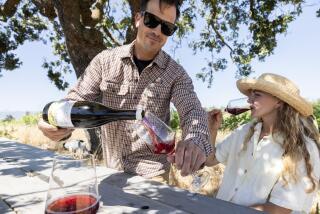Baked Good : These sweets are delicious and healthy, and the way they are made protects the environment.
- Share via
Here are some tips on how to have your cake and eat it too--ecologically.
Vicki and Charles Avants, working on Main Street in Ventura under the Harvest Farms sign, are producing some delicious treats, which, it turns out, are eco-terrific as well.
Okay, you’re thinking, their cookies may be low-risk from a health standpoint--no cholesterol and all--but health has nothing to do with the environment. And, anyway, with a slogan like “the world’s most honest cookie” and an ingredient list promising no wheat, sugar, yeast, eggs or animal fat, there can’t be any taste left at all. Right?
Wrong.
Folks, I defy you to eat just one Lemon Almond Thrill cookie. I mean, I defy you to eat just one if there’s another one being offered to you. In a recent month, 20,000 cookies went out to the once-skeptical.
Lest this sound like a commercial for a local baker, let me point out that they have a friendly competitor up the coast in Santa Barbara. That company, Tropper’s, lists similarly daunting ingredients for their product The No Muffin. Last year, they shipped 6 million of these.
Another eco-brand of baked goods, Health Valley (made in Irwindale) is even more widely sold. Spokesman Harry Urist set the tone for all my interviews when he said: “We don’t want to be the only people doing this. We want everybody to bake this way.”
OK, cutting out all these ingredients may be good for our bodies and may even taste great. But what’s in it for the Earth? I was astonished to discover that the missing animal products--the absent cholesterol-related stuff like fats, milk and eggs--represent a tremendous saving of California water. Almost astronomical.
According to David Buettner, assistant director of the Ventura County Agricultural Commission, the production of one pound of edible beef, requires 5,000 gallons of water. A single egg requires 500 gallons of water. Conversely, a pound of wheat takes just 25 gallons, and a pound of grapes--the source of much of the sweetening these bakers use--requires 70 gallons.
Animal fat, already a serious heart and cancer question, is also a serious water issue. On May 20, The Times editorialized: “Alfalfa is so water-intensive, (and it) translates into dairy products consumers don’t need--all being produced with water equal to half of what the state sells Southern California in a normal year.”
Last year, I told you about the petroleum consumption, rain-forest loss and even ozone depletion involved with cattle raising. But this water issue hits closer to home.
According to Earthsave, an environmental watchdog group in San Francisco, the amount of U.S. cropland devoted to producing fruits and vegetables is only 2%. Almost all of Ventura County’s agricultural activity falls into this category.
Janette Scovill of the Thousand Oaks-based California Vegetarian Assn. told me about a potluck supper and preview of an interesting TV show on this topic, produced by KCET and destined for national broadcast this fall.
Earthsave and Scovill’s group are presenting the screening of “Diet for a New America,” based on the book by John Robbins. You don’t have to be a vegetarian to attend. But you do have to be interested in great-tasting food--and maybe water conservation.
* FYI
* The California Vegetarian Assn., headquartered in Thousand Oaks, has a hot-line guide to Ventura-area vegetarian restaurants and activities: 378-5098. Their monthly newsletter is Abundance.
* Harvest Farm Cookies, The No Muffin and Health Valley baked goods are available in the county at Lassen’s Health Food, Mrs. Gooch’s Natural Foods Market and some major chain grocery stores.
* Earthsave’s special screening of “Diet for a New America” is tomorrow at Earth Trust House in Malibu. Call (213) 964-4455 for reservations.
* John Robbins’ book, on which the TV film is based, is available for $13.95 by calling (800) 451-0303.
* Vegetarian Times magazine is available at local health food stores.
More to Read
Eat your way across L.A.
Get our weekly Tasting Notes newsletter for reviews, news and more.
You may occasionally receive promotional content from the Los Angeles Times.










